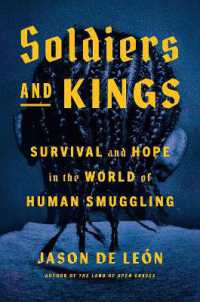- ホーム
- > 洋書
- > 英文書
- > Science / Mathematics
Full Description
The scholarly debate on deliberative democracy often suggests that participatory processes will contribute to make environmental governance not only more legitimate and effective, but also lead to the empowerment of marginalized social groups. Critical studies, however, analyse how technologies of governance make use of participation to draw boundaries that separate technical knowledge from political concerns, direct the focus towards procedural aspects and contractual obligations, and reinforce hegemonic understandings of development and of local people's relationships to their environment. This book focuses on the dynamics and use of participatory mechanisms related to the rapid expansion of the extractive industries worldwide and the ways it increasingly affects sensitive natural environments populated by indigenous and other marginalized populations. Nine empirically grounded case studies analyse a range of participatory practices ranging from state-led and corporation-led processes like prior consultation and Free Prior and Informed Consent (FPIC), compensation practices, participatory planning exercises and the participation in environmental impact assessments (EIAs), to community-led consultations, community-based FPIC and EIA processes and struggles for community-based governance of natural resource uses. The book provides new insights through a combination of different theoretical strands, which help to scrutinize the limits to deliberation and empowerment on the one hand, and on the other hand to understand the political resistance potential that alternative uses of participatory mechanisms can generate.
The chapters originally published as a special issue of Third World Quarterly.
Contents
Introduction: New mechanisms of participation in extractive governance between technologies of governance and resistance work Esben Leifsen, Maria-Therese Gustafsson, Maria A. Guzmán-Gallegos and Almut Schilling-Vacaflor 1. Who controls the territory and the resources? Free, prior and informed consent (FPIC) as a contested human rights practice in Bolivia Almut Schilling-Vacaflor 2. Weaving hope in ancestral black territories in Colombia: the reach and limitations of free, prior, and informed consultation and consent Marilyn Machado, David López Matta, María Mercedes Campo, Arturo Escobar and Viviane Weitzner 3. Claiming prior consultation, monitoring environmental impact: counterwork by the use of formal instruments of participatory governance in Ecuador's emerging mining sector Esben Leifsen, Luis Sánchez-Vázquez and Maleny Gabriela Reyes 4. Between oil contamination and consultation: constrained spaces of influence in Northern Peruvian Amazonia María A. Guzmán-Gallegos 5. A vote to derail extraction: popular consultation and resource sovereignty in Tolima, Colombia John-Andrew McNeish 6. The struggles surrounding ecological and economic zoning in Peru Maria-Therese Gustafsson 7. The politics of planning: assessing the impacts of mining on Sami lands Rebecca Lawrence and Rasmus Kløcker Larsen 8. Shaping projects, shaping impacts: community-controlled impact assessments and negotiated agreements Ciaran O'Faircheallaigh 9. 'Nosotros Somos Estado': contested legalities in decision-making about extractives affecting ancestral territories in Colombia Viviane Weitzner








